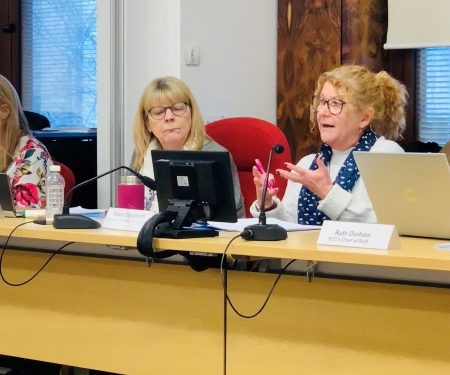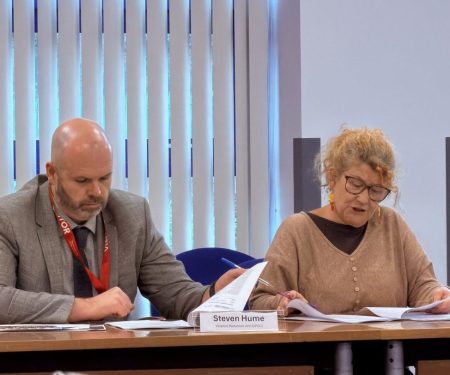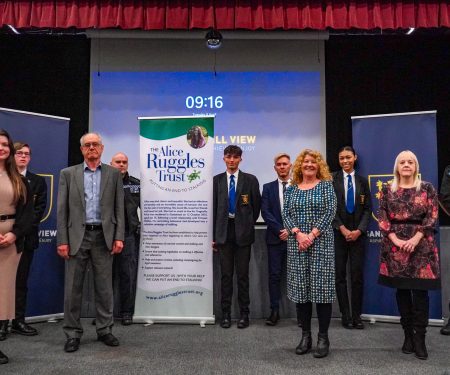AN innovative partnership that aims to tackle staking behaviours and prevent reoffending has worked on 43 high risk stalking cases in its first year.
The Northumbria Stalking Interventions Programme (NSIP) brings together police, probation, victim services and health professionals to raise awareness of stalking among colleagues, better manage the risk of those exhibiting stalking behaviours and ensure victims are offered the best protection and support.
The project became operational in 2024, with funding secured through the local Probation Service and the Office of the Police and Crime Commissioner for Northumbria.
In the project’s first year, the key focus has been training practitioners to recognise early signs of stalking behaviours and ensuring stalking-specific risk assessments are carried out for high-risk cases. NSIP has developed and delivered a stalking awareness package to 2332 practitioners throughout probation as well as other partner agencies within the Northumbria force area.
Another part of the project is provided by CNTW who help risk assess the cases of highest concern and advise on risk and safeguarding. Expertise includes the advice from forensic psychiatrists and psychologists who assist other agencies in comprehensively understanding the risks presented and advice on management strategies aimed at protecting the victims and the general public.
Crucially, alongside all this work, the project also ensures all agencies are communicating to ensure victims access specialist emotional support and safeguarding advice through Paladin National Stalking Advocacy Service and Northumbria Victim and Witness Service (NVWS). Together they have supported 26 people through NSIP.
Examples of behaviours of perpetrators referred to the programme include making threats, tracking victim whereabouts (often online), making unwanted contact, breaching restraining orders, turning up at a victim’s home or a children’s school and other behaviours.
Of the 43 individuals successfully referred onto the programme, the most common relationship between perpetrator and victim was ex-intimate partner (81.4%), and of the 43 referrals, 42 were male.
Project successes to date include influencing court disposals and assessments, arrests for the most concerning stalking perpetrators, enhancing safeguarding and support to victims, increasing information sharing between partners, victims having increased feelings of safety, and there are early indicators of reduced harm to identified victims and future victims through action taken.
The Northumbria Stalking Interventions Programme (NSIP) is a multi-agency project involving collaboration between partners from the Probation Service, Northumbria Police, Cumbria, Northumberland, Tyne and Wear NHS Foundation Trust (CNTW), the Office of the Northumbria Police and Crime Commissioner (PCC), Northumbria Violence Reduction Unit, Paladin National Stalking Advocacy Service, Northumbria Victim and Witness Service and the Alice Ruggles Trust.
Northumbria Police and Crime Commissioner, Susan Dungworth, said:
“Stalking is a very frightening and intimidating crime and the earlier we can all come together to protect the victim and change the behaviours of those doing the stalking, the better. We call this a multiagency approach, and I really believe it’s the best way to address stalking by ensuring effective communication and information sharing.
“Tackling Violence Against Women and Girls in all its forms is very much a priority of my Police and Crime Plan. We know stalking remains an under-reported crime and I want to make victims feel empowered to speak up and report it. I want to highlight this programme, so people know stalking is something we’re taking seriously whether that’s improving the policing response or working to change perpetrator behaviours. This programme is presenting a real opportunity to reduce offending, while supporting victims and improving their overall experience of the criminal justice system.
The PCC added: “Fortunately we have a government that’s taking stalking seriously too, looking to introduce new measures to strengthen enforcement and better protect victims, such as making it easier for courts to issue Stalking Protection Orders and improving information sharing with victims. I believe these new measures will make it easier to protect victims and hold perpetrators to account. These are meaningful changes that will help us tackle stalking head on.”
Paul Weatherstone, Head of Newcastle upon Tyne Probation Delivery Unit, said:
“We know that stalking causes significant harm and distress to those involved and the best way to tackle it effectively is by organisations working together to hold the perpetrator to account and promote behaviour change while also making sure that the victim is kept safe.
“As the Probation lead for the Northumbria Stalking Interventions Programme I am really proud of all that we’ve achieved to upskill literally hundreds of Probation staff across the North East Region to better recognise, assess and address the risks associated with stalking. I’m also really proud of the central role that Probation has played in establishing this important multi agency approach to address an issue of increasing concern.
“By working collaboratively we’ve already been able to deliver some really positive change about the way we work with stalking. Looking ahead, it’s crucial that we build on what we’ve achieved so far and continue to work together to better protect victims and make our community safer.
Dr Rajesh Nadkarni, Executive Medical Director and Deputy Chief Executive for Cumbria, Northumberland, Tyne and Wear NHS Foundation Trust (CNTW), said:
“We have a long history of working in partnership with police, probation, courts, and other agencies. This includes providing clinical advice, training, and working strategically with our partners. Stalking and associated behaviours cause significant harm and distress to those involved and often needs a multiagency management response. The Northumbria Stalking Interventions Programme has formally brought together much of this work and expanded the team of people and resources dedicated to it. We are delighted to provide specialist expertise to this programme and, with our partners, continue to strive to make our communities safer.”
Chief Operating Officer, Louise from Paladin NSAS, said:
“A member of our team sits within the clinic meetings and discusses the weekly referrals to ensure the victim’s voice is considered, support offered and to highlight the lifelong impact that stalking has on victims. The NSIP is a positive step forward for the area to improve the response to stalking across the local criminal justice system, with the aim to better identify, support and protect victims of stalking and effectively manage stalking offenders.”
Clive Ruggles, The Alice Ruggles Trust, said:
“Stalking is a hideous form of abuse that can take many forms but always involves unwanted intrusions into people’s lives, repeated endlessly, leaving victims in despair and distress and often in fear of their lives. In the worst cases this fear is justified, as I know all too well following the murder of my daughter Alice in Gateshead back in 2016.
“Stalking is shockingly widespread and cases, when they come to the attention of criminal justice or healthcare professionals, are all too often inadequately dealt with. This is why projects such as NSIP, which brings together a range of agencies to mitigate the risk to stalking victims and help them navigate a way forward, are so vital.
“In the Alice Ruggles Trust we believe that the only way to tackle the problem in the longer term is to change the mindset of a generation, which is why we focus on educating young people to recognise the seriousness of stalking, to look out for those around them, and know where to go to seek help. And an essential part of our strategy is to stop people becoming stalkers in the first place, by helping youngsters identify and tackle problem behaviours before they escalate.
“We are proud to be part of the NSIP project, which ties together these approaches, and are confident it will help lead the way to a future with far fewer stalking victims and adequate protection and support for those who do remain. The ultimate goal has to be to bring stalking to an end, and we can only do that by working together.”
Assistant Chief Constable Alastair Simpson, of Northumbria Police, said: “Stalking is a crime which sadly can often have a lifelong impact upon victims.
“Since it was launched last year, the Northumbria Stalking Intervention Programme (NSIP) has been making steady progress in assessing the highest risk offenders – before intervening and diverting them away from stalking behaviours through agency appropriate management and referrals.
“The initiative also seeks to further equip specialists across the multitude of agencies involved in NSIP with the tools to increase their knowledge, understanding and confidence when identifying and dealing with stalking.
“As a Force, we are supportive of the collaborative and innovative approach by joining agencies together in the pursuit of perpetrators and the safeguarding and protection of vulnerable victims.”








